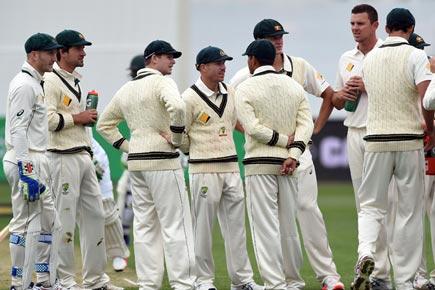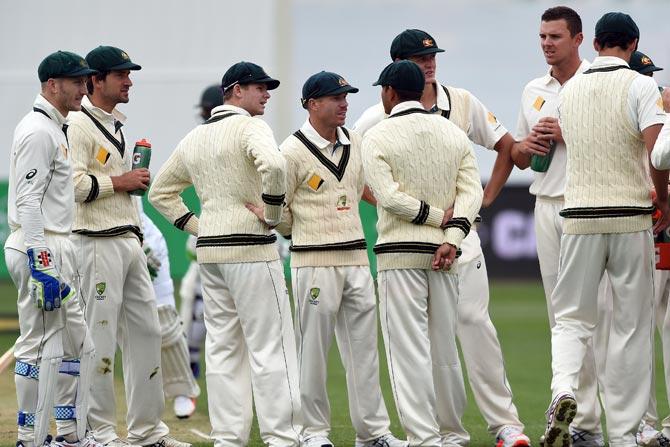What the Hobart debacle has put to rest is the notion that Australia are vulnerable to spin and that overseas teams deliberately doctor pitches to nullify Australia's strengths. To be honest, they don't need to.


Australian team wait for the third umpire's decision during third day's play of the second Test against South Africa in Hobart. Pic/ AFP
ADVERTISEMENT

The Bass Strait is the sea separating Tasmania from the Australian mainland. For the Australian cricket team, humbled by South Africa overnight, it represents yet another "overseas" batting collapse. But this time, there can be no excuses. They can't blame the heat, the low-grade hotels, the spicy food or jetlag. Unlike their forthcoming tour of India, where the usual excuses about doctored pitches will be trotted out by Australian journalists, Hobart is a recurring nightmare that even the hypocrites cannot find convenient excuses for.
To put it into context, imagine the howls of protest that would emanate if Australia was beaten in an overseas Test that lasted just two days. Allowing for the rain delays on Day 3 (Day 2 was washed out), this Test lasted barely more than two days. Less than 200 overs in total. South Africa batted for 100 of them. Australia lost 20 wickets in 93 overs. That's a wicket every 4.5 overs. Any mention about a doctored pitch?
The easy accusation when playing (and losing) in the Subcontinent is that the pitches don't give the fast bowlers a fair go. There's no balance between seam and spin. When Australia returned from their 3-nil drubbing in Sri Lanka recently, there were dark murmurings about pitches that were tailor-made for spin bowlers. Mitchell Starc, delighted to be back in Perth last week, before he returned figures of 1/114 in the second innings, made no secret of the fact that it was nice to be back bowling on decks that were more helpful for the quicks. Perhaps he forgot the 24 wickets he picked up in Sri Lanka.
Compare that to this Hobart Test - of the 30 wickets that fell, 29 were to the quicks and the other was a run-out. Not a single wicket to the spinners despite almost 25 overs being bowled by the slow men. Any talk of a fair balance between bat and ball, seamers and spinners?
Fifteen wickets fell on the first day of a Test. The team batting first bowled out for 85. No howls of protest about poor pitch preparation? Don't forget, the first day was not rain-affected, despite cloudy skies, so the curator cannot hide behind the excuse that the pitch got wet. He produced a result wicket that exclusively favoured the quicks, the game finished in almost two days and fast bowlers took every single wicket that fell to a bowler. Imagine a Test in India if Australia or England were beaten in this manner and the spinners took every wicket... the ICC would be called upon to investigate.
What this Hobart debacle has put to rest is the notion that Australia are vulnerable to spin and that overseas teams deliberately doctor pitches to nullify Australia's strengths. To be honest, they don't need to! On current form, if it swings like in Trent Bridge, Cape Town or Perth recently, Australia's batsmen cannot play with soft hands. If it spins, like in the UAE, India or Sri Lanka, they are vulnerable with bat and ball. When pitches are flat and conditions are ideal for batting, like it was when India toured Australia in 2014, they score quickly and they score heavily. They play with heavy hands that reach for the ball, they hit the ball on the up with minimum footwork and they murder mediocre bowling. But Test cricket is called that for a special reason - it's not homogenous, it tests your skill in all types of conditions and there's nowhere to hide when you get exposed at home, in your own conditions.
This is not the demise of Australian cricket by any stretch of the imagination. Everyone's entitled to have a bad game or five. But they're now having to turn their fortunes around in front of a home crowd that has finally seen through some of the paper-thin excuses that were trotted out to mask overseas failures. The local scribes are falling over themselves to stick the knife in - selectors, board members, medical staff, groundsmen...no one is immune from the blame game. It is the lesson in humility that should not go unnoticed, even in India. Especially in India!
Michael Jeh is a Brisbane-based former first-class player
 Subscribe today by clicking the link and stay updated with the latest news!" Click here!
Subscribe today by clicking the link and stay updated with the latest news!" Click here!






